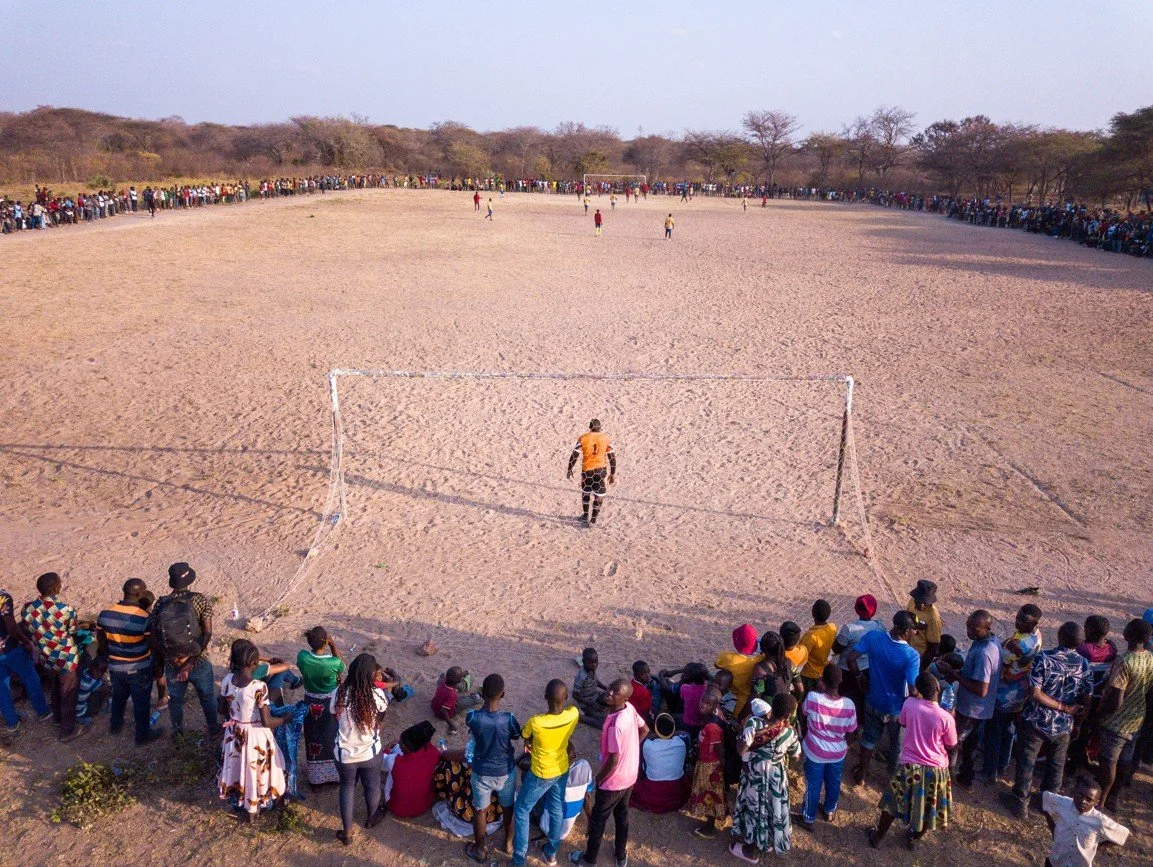Sport Supporting Coexistence
This month, working with STEP, we supported the Tembo Cup in southern Tanzania, using sport to connect over 1,000 community members with practical training on living safely alongside elephants.
In Tanzania, one of our impact partners is the Southern Tanzania Elephant Program (STEP), a local NGO operating across key elephant ranges in the south of the country. Our funding supports their work which includes elephant monitoring, ranger support, habitat protection and, critically, community outreach. STEP’s focus is on coexistence, reducing conflict where elephants and people share space. Their initiatives are practical, focused on reducing crop loss, improving community safety, and strengthening the connection between people and wildlife through education, training and direct support. Their work often starts in the fields or along the edge of a forest, extending into classrooms, living rooms, and, occasionally, onto football pitches.
What is the Tembo Cup?
In southern Tanzania, sport has become a tool for conservation outreach for rural communities in the Greater Ruaha ecosystem. Earlier this month the Tembo Cup took place, a ten-day community event held in Kizigo Game Reserve that uses football and netball to build interest and participation around elephant education. STEP organises it with support from Tanzania Wildlife Authority (TAWA) and local game reserves, with funding from NawiriGroup.
The games are popular. The Kizigo final on the 20 July 2025 brought in over 1,000 people. Men’s football and women’s netball are the centrepiece, but traditional games such as bicycle racing help attract an even wider crowd. There are small cash prizes, football kits and tokens for the winning teams and standout players. Everyone who takes part, plays or watches, also hears about elephant behaviour and what to do in the case of an encounter.
Each day starts with educational sessions held in local primary schools, attended by hundreds of students with messaging focused on elephant behaviour and personal safety. Children join the interactive sessions to learn how elephants move, and how they should walk in the opposite direction of the wind, a technique known as kukata upepo, so the elephant doesn’t detect their scent and charge. In the afternoon, participants take to the pitch for matches, followed by open-air film screenings in the evening. This year, Kizigo FC won the final in front of a large crowd, scooping the top prize, with Nkonko FC finishing second. Individual players were awarded for top scorer, best goalkeeper and best player overall.
Football as an Education Platform
In this part of Tanzania, living with elephants is a fact of life and many households lie within reach of forest corridors. Coexistence brings risk. Wandering elephants can damage fields and wipe out crops overnight and many of the people who watch or play in the Tembo Cup matches are all too familiar with the cost of living alongside wildlife. The event offers an opportunity to educate on how to respond to elephant encounters, reducing the risk of conflict.
Football and netball are deeply popular in Tanzania. Sports events offer non‑formal, mass‑appeal platforms that invite a wide gathering of people who are receptive to learning about human safety around elephants and crop protection techniques.
Andrea Godfrey Daudi, a player from Kizigo FC, explained how it felt.
"The Tembo Cup brings together people from different areas of Kizigo. It is a very good and simple way to teach us about elephants. We live so close to them and rarely get such education.
For me this is very relevant. I once lost my crops to elephants. STEP work with farmers and somebody came to visit me and taught me what to do in case they invaded again. I was shown practical methods to deter them from my farm. Now, when I encounter an elephant, I know how to avoid harm."
Another player, Emmanuel Philipo, who was on the Muhesi FC Mpapa team, also shared his thoughts.
"Through the Tembo Cup, we receive important education before, during, and even after the games.
No other organisation has ever given us this kind of knowledge the way STEP and TAWA have. Personally, I’ve never been harmed by elephants, but my neighbour once experienced an invasion. I was able to help him because I had already received training on what to do in such situations."
The Tembo Cup is part of a wider conversation about what coexistence looks like on the ground. It is community-led and context-specific. It brings together those who are most directly affected and offers a space where practical knowledge is shared without formality. For communities living at the boundary of protected areas, this kind of engagement builds understanding that sits alongside lived experience.





